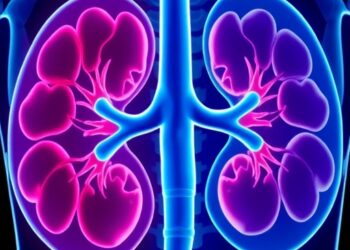Surgical removal of the tumour is considered the basis for curing gastric cancer. However, 40 per cent of patients who have undergone surgery suffer a relapse within two years. A research team led by MedUni Vienna has now investigated a prognostic marker that can be used to identify patients with a high risk of tumour recurrence. The study’s results, recently published in the journal “Scientific Reports”, can therefore improve personalised treatment for stomach cancer and increase the chances of survival for those affected.
Surgical removal of the tumour is considered the basis for curing gastric cancer. However, 40 per cent of patients who have undergone surgery suffer a relapse within two years. A research team led by MedUni Vienna has now investigated a prognostic marker that can be used to identify patients with a high risk of tumour recurrence. The study’s results, recently published in the journal “Scientific Reports”, can therefore improve personalised treatment for stomach cancer and increase the chances of survival for those affected.
In their analyses of tumour samples from 182 patients who had undergone surgery for gastric cancer at MedUni Vienna/University Hospital Vienna, the research team led by Elisabeth Gruber (Department of General Surgery) and Lukas Kenner (Department of Pathology) focused on AF1Q. This is a gene that was discovered initially in connection with blood cancers such as leukaemia and is now known in medical research for its influence on various cellular processes that contribute to the development and spread of cancer. “The role of AF1Q in gastric cancer has been largely unexplored to date,” says Elisabeth Gruber, describing the initial situation.
As the study shows, 178 of the 182 tumour samples examined, i.e. 97.8 percent, have moderately to significantly elevated AF1Q levels, associated with a higher risk of recurrence and lower chances of survival. “This qualifies AF1Q as a promising biomarker that can be used to better assess the prognosis of patients,” emphasises Elisabeth Gruber. “Our results justify including AF1Q in the diagnostic process,” adds Kenner. Specifically, the newly identified marker could be considered when examining tissue samples from the tumour to identify an increased risk of recurrence at an early stage and adapt the treatment measures individually.
Fourth most common cause of cancer death worldwide
Stomach cancer is the fifth most common type of tumour and the fourth most common cause of cancer death worldwide: In 2020 alone, it accounted for around ten million deaths. Surgical removal of the tumour is considered the basis for curing stomach cancer. However, 38.8 per cent of patients in Europe (Asia: 60 per cent) suffer a recurrence within two years of the operation. “Our study can help to optimise patients’ follow-up care and increase their chances of survival,” say Gruber and Kenner, emphasising the relevance of the findings.
Journal
Scientific Reports
Article Title
Screening for oncogenic AF1q expression predicts disease recurrence in gastric cancer patients
Article Publication Date
10-Jul-2024




